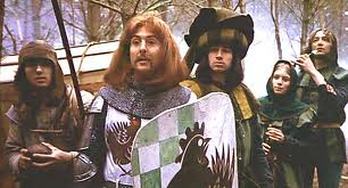 Gamer Forge Listener Email: Name Matthew Spencer Comment Hey DCR could you talk about this on your show? We are a small gaming group in Calgary and could use your insight. Also we just have to say we love the Ed & Double D special! So here is my question. How do I deal with overly cautious players? Recent encounters with hard to hurt opponents have left the party pretty beat up. Now the players are now seemingly scared by similar encounters and prefer fleeing. I'm GMing a game of Pathfinder for friends, using a premade module. They plays a team of four characters and it's been going great so far. Recently though, the group has started facing harder opponents with various immunities or high damage output. Result: the party has taken a beating but is still alive. My players confidence though? Went down for the count. The party had a series of encounters with creatures that displayed unusual powers and immunities. Some of them were more dangerous than I think the module intended, and others would have been less dangerous but the party didn't react the way the module expected (not least because they were spooked by the earlier dangerous encounters). The party also didn't get any mental breathing room by being given fights they could simply smash in between these more dangerous or unusual encounters. This resulted in the players quickly getting spooked, feeling like they were in over their head, and so we spent the session with the characters running away. It did not make for a fun session on either side. How do I reassure the players and make the fighting something to look forward to rather than a frustrating experience of hide and seek? Should I start adapting the scenario to manage the player's fear level and put a few easier encounters to show their party is not inept? Or should I push some tools that could help against those opponents? Sub-questions: • How do you reassure your players when a new encounter brings back an unexpected previous-encounter trauma? • How do you reconcile the fact the encounter is meant to be scary, is indeed scary to the players, but you suddenly wish it would not be? The issue has been discussed with the player right after the session since it was obvious we were both disappointed by these few hours. He admitted being gradually scared by multiple things: • A previous encounter with a creature which required spending more resources than usual to defeat. The problematic encounter is meant to look like that creature at first, so... trauma. • The description of the new creature (it is eerie and menacing in various ways) • The legend one of the PCs remembered, which seems linked to the creature (legendary creature?!) • The problematic encounter's secret true nature led to alarmingly unusual and apparent rule-breaking effects when the party didn't figure out the truth quickly. The player actually enjoys combat, quite possibly more than roleplaying encounters. He is not yet knowledgeable about all the tactical possibilities of the system though (nor am I, really). Gamer Forge Response: Holy guacamole! This one was a doozy! Its a bummer when your heroes get their day wrecked, but when it comes to climbing back on the saddle, DCR says: 1. It's okay to stroke their ego a little. That's the importance of henchman. Not every battle or conflict needs to be epic-sized. If "epic" is the norm, then what becomes the new "epic"? When the players are having a problem getting their confidence back, throw them a bone. Give them a battle or two with some puny goblins or something. But when you throw them a bone, DO NOT throw them a curve ball. If they find a five skeletons, then they find ONLY five skeletons. No swerves. What they see is what they get. The bridge of trust needs to rebuilt, and it won't happen if they don't trust the one responsible for telling where the bridge leads. 2. Introduce an NPC to accompany the heroes to give them a boost of confidence. But friends don't let friends play NPC's willy-nilly. An adventuring NPC should never outshine or outperform a player character in any statistical manner. The NPC is there to act as cheerleader, or worst case scenario, as training wheels. If the players grow attached to the hireling or henchman or whatever the NPC ends up being, just have it handling things non-specifically in the background. Let the players have the spotlight whenever possible. If you want to hire a mercenary or henchman to carry your adventure gear, remember that players should have to pay or share the spoils of battle, including experience. This opens the door for when the players wish to separate from the NPC by not letting them get too attached. On the other hand, if the players do get attached, they won't mind so much sharing the spoils and can be there to cheer on the players once the training wheels come back off. This is about getting their confidence back, after all. 3. Now, for the hard part. And we all three agreed that this one is tough. But some lessons need to be learned the hard way. If your players drew the conclusion that the creature was legendary because the words "legend" and "creature" appeared in the same sentence, then they deserve what happened. If the DM gave them ample chances and clues to keep them on a certain path, and they still arrived at that conclusion, then they deserve to be running. They bit the hand that fed them. But now that that part is over, now its time for both parties to move on and learn from the mistake. Hopefully, the players can take a hard, objective look at the problem and the outcome, and take back an experience of growth. And laughter. If you can't laugh after learning, then what was the point of learning anything? Bonus XP: For the penultimate NPC, look no further than Star Wars. C-3PO was annoying, eccentric, droll, and flat-out hated by fans. But there were a few moments where the heroes would not have succeeded without his help. Yet, he was out-classed physically by everyone else, including R2-D2. When it came time to fight, he scooted neatly into the background, and helped set the mood for the entire film franchise. He was endeared just enough to keep him around, and filled just the right niche when the time was just right. Most importantly, he was right beside the heroes during their greatest moments and welcomed them home, not do the work for them or take credit. Perfect. Simply perfect.
0 Comments
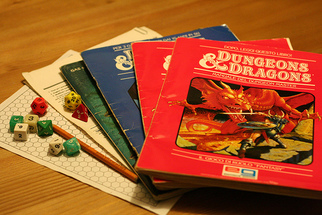 This week, we took a look back at when players are getting their feet wet for the first time. Whether you're a new gamer, or a seasoned veteran, DCR says: 1. Help whenever possible, but only when asked. This coincides with one of our Ten Commandments of Gaming, "encourage new players and invite them back." More experienced players should create an environment of openness to players who are learning. Much like a good college professor or a mentor, its about being a teacher/student. Don't let this go to your head, because this is only a temporary situation. A good teacher can have a student learning on their own and instill a sense of confidence in their students. Sometimes it may get to be a hassle to help new players learn a new skill, but it is so very worth it when a player finally "gets it". Answer questions for a new player, but encourage him/her to find answers on their own. Point them in the right direction. 2. It may sound tempting to know everything about a game system, but it isn't worth it. Don't bother. Start with the basics. Focus on learning the core mechanics and the other nuances of your game usually just fall into place. Let your knowledge grow naturally. There is no need to rush to catch up to the other players. It may even take a few years for this to come to fruition, but again, it's so worth it. 3. Find common ground. Experienced players should remember when they were first learning a game and what it was like for themselves. New players can aspire to find the characters that are right for them, and the methods in which they like to play. All players can swap war stories about their favorite moments. Every player, whether old or new, has a great opportunity to make friends that you may not otherwise have had a chance to meet. *Bonus XP: All of this ties into one easy statement: Drop the pretense of superiority! There is no need for such a counter-productive mentality. It's this common perception in the public eye that scares new players off. Do some real good for your favorite pastime and your friends, and just do a reality check. Help, learn, and don't sweat the small things. 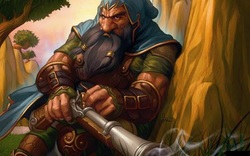 Gamer Forge Listener Email: Name Mark Jacobsen Comment A friend of mine is planning for a campaign in a colonial/pirate setting, and is planning on re-skinning crossbows as firearms, (i.e. light crossbow = musket, hand crossbow = flintlock), but I was wondering if there were already rules for such weaponry. Gamer Forger Response: Catch-a-Gun! Uggghhh. That sounds bad, just typing it. When you a crossbow just won't cut it for your pirate, DCR says: 1. The DMG says 1d10 with a times two critical multiplier. Fantasy settings often don't give much love to firearms, even Renaissance-era flintlocks. So, unfortunately, that's all the official answer gives us. 2. However, D20 Modern gives a host of options with your firearms. The books Ultramodern Firearms and D20 Weapons Locker give all the deets about all the guns you will ever need, including the stats and damage for the game. If you were expecting some huge damage rolling because it's "from the future", then prepare for disappointment. most guns comes up as 1d10 with a times two critical multiplier. Just like it says in the DMG. Most game systems give all the rules for firearms, and most just carryover from setting to setting. You just won't get the ridiculous damage rolling no matter where you go. 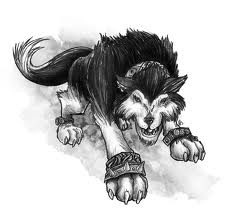 Gamer Forge Listener Email: Name Walter Smith Comment I’m just curious if any supplement out there includes an Animal Companion that is not, in fact, an Animal. As in the type. I mean that just any Druid of sufficient level can take; there are probably feats that allow you to get nonstandard Companions from other types, but I mean just ordinary “Animal” Companions. Bonus points if the Animal Companion in question is an Aberration, Dragon, Elemental, Magical Beast, or Plant, and thus qualifies for Rapidstrike. Super bonus points if you find a Construct or Undead, because that would just be weird. Gamer Forger Response: Catch-a-Familiar! Okay, just had to try again. That's the last one, promise. When your run-of-the-mill familiar just isn't sitting at the cool kids' table, DCR says: 1. Familiars can often be designated as any commonplace animal. Part of the point of the familiar is that, by themselves, they don't stand out very much. Most familiars confer a small, one-time bonus at the start of game play. Usually a small bonus to a skill or a small, special attack the familiar can do. It's what the familiar does over time is what makes them special. 2. If you want a familiar that is not only different, but almost diabolical, try a humunculous. It's a familiar that is constructed from the master's own blood. It behaves in the same way as a normal familiar does, just more...gross? 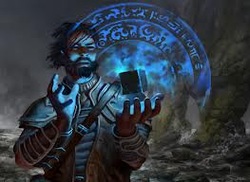 Gamer Forge Listener Email: Name Rick Bosco Comment Why are wizards and their ilk so restricted in their choice of personal armor in most fantasy roleplaying games? (...let alone novels etc.) Sure, learning takes up a lot of time, especially about such an arcane and cryptic subject as magic - but this is just a stereotype. Games and worlds could both easily be designed otherwise. Why is this stereotype so prevalent, and where does it come from? Gamer Forger Response: Does the clothes make the hero? DCR says: 1. Armor, in all actuality, is bulky and restrictive. There's nothing in the rules that says you absolutely cannot wear armor, it's just never recommended. A sorcerer's/wizard's movements are commonly the most important aspect of the magic. It's more dramatic that way, trust us. Also, mages become some of the most potent damage dealers around. So a heavy cannon that also becomes impossible to damage? Talk about unbalanced! 2. Lightning Rod! It's about the real-life repercussions of what you're doing. A fireball is very, very hot. When you wrap some meat in tinfoil and make it very, very hot, what happens? It cooks! Remember, a mage in heavy plate mail acts as a lightning rod when casting lightning spells, and becomes terribly frozen when using cold spells. However, you can double-dog dare a party member to stick their tongue to your armor right after casting "Touch of Frost" on yourself. Just saying. 3. Action heroes! Bruce Willis wasn't awesome in Die Hard because he was wearing heavy armor. Hell, he wasn't even wearing shoes! Star Wars Saga Edition best reflects the action hero mentality with an ever-increasing defense. So, we say NOT wearing armor has it's merits, so don't knock it. Unless, of course, you want to make a few extra coin by double-dog daring someone. *Bonus XP: To go the extra mile, take a few minutes and give your familiar a bit of personality. A simple quirk to draw a little more attention to it and have a little fun with it. But remember that the character is the main focus, so don't stress the familiar too much. Archemedes from the animated Sword in the Stone is a classic example of a familiar. Not very exotic. Quirky. Understated. Relevant. All the makings of a great supporting character. 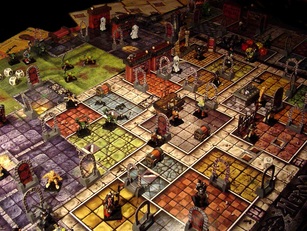 Sweet! A series of easy to answer questions! Gamer Forge Listener Email: Name Robert Tiffany Comment I could have sworn that I read somewhere that the War Domain granted Improved Unarmed Strike when the god favored them, but I can’t find it now. Did I just imagine this, or is it an actual rule somewhere? Gamer Forger Response: So, when it comes to being EXTRA AWESOME in the eyes of your deity, DCR says: 1. This sounds like a house rule. Nothing wrong with that. A cleric is, by default, already favored by his/her deity. That's the source of their spells. If a DM wants to grant an additional favor for being an EXTRA AWESOME cleric, then who are we to argue? Gamer Forge Listener Email: Name Kevin Hardison Comment How does a mount interact with its rider in regards to Reflex saves? Example: •If a mount has a better reflex saving throw can the rider use its save instead of his own? •If a mount has evasion and the rider does not, does the rider gain the benefit of it? •Does the opposite apply as well? (rider with evasion on mount without, mount uses rider's save ) •Is the relationship between rider and mount important ( e.g. animal companion, special mount, familiar, 'bought the mount with gold', 'raised him from a pup', etc.)? Gamer Forger Response: When you can't quite figure out how your special mount helps you, DCR says: 1. When calculating your mount's NADS (Non Armored Defense Score), use either the typical saving throws for a standard creature of it's type, or the owner of said mount, whichever is higher. 2. Evasion is granted by the rider. A familiar sometimes grants Evasion to it's master, but not normally to a rider of a mount. Evasion must be gained by the rider all on his/her own. That being said, the bonus granted by the ability should only be used by the mount while mounted. Gamer Forge Listener Email: Name Hank Fielding Comment Degrees of cover and concealment are defined in the Player's Handbook (pp 280-281). There it discusses cover, superior cover, concealment, and total concealment. However, many powers and features elsewhere make use of partial cover and partial concealment, which the PHB doesn't mention at all! What do these new terms mean, and how are they different from regular cover and concealment? Gamer Forger Response: When you can't shake the feeling that someone is watching you, DCR says: 1. Ability to see vs. ability to hit. Sometimes they can be the same. You can hide behind a brick wall and can be neither hit nor seen. But if you can hide in a tree, chances are good you can possibly be hit, but not necessarily seen. Often, concealment warrants a percentage chance to miss outright, no matter what the attacker rolls to hit. Cover is often quantified as a bonus to armor class or defense. Concealment is described (usually) as partial or full, while cover is defined as half or total. Reference your corresponding rulebook for the proper bonuses to apply depending on the situation. Gamer Forge Listener Email: Name Jennifer White [email protected] Comment The Warlord ability Inspiring Word states that it allows a target to use a healing surge - does it require the target to use a minor action to use such healing surge? Or is it basically the equivalent to a healing spell assuming that target has a healing surge to spend? In other words, to use Second Wind (the only time I can use a healing surge in combat) I have to spend a standard action to do so...if my Warlord uses Inspiring Word on me do I need to spend an action to use a healing surge and if so, what type of action? Gamer Forger Response: What is war good for? Healing, kids! When your Warlord is doing his/her best to help, DCR says: 1. The Warlord is the one spending the action to apply the healing, not the target. The recipient only marks the healing surge off their page and applies the healing to their character. No further action is required. Go, you! *Bonus XP: For a fun example of cover vs. concealment, watch the film True Lies. Tom Arnold trying to hide shows just what it means to cover, but not conceal. At the end of Sherlock Holmes Game of Shadows, Robert Downey, Jr. gives a fine example of concealment, without cover. Gamer Forge Listener Email:
Name: Pamela Wilson Comments: In a game that I'm in, the DM has decided to go with a lycan vs. vampire concept, and this has created a few conundrums. Can you give your input as to these conundrums? One of the characters in our group is a dragon disciple, and another character is a barbarian. Both of them decided to take the vampire route, but no one is sure what happens with their constitution-increasing abilities. For example, when the barbarian rages, would that increase his charisma, instead of his constitution? So far as I can find, whenever a creature doesn't have an ability score (such as a construct or an undead or an incorporeal) generally they use another ability score for all purposes the other would cover. For example, undead use their charisma modifier to determine health and fortitude bonuses, as they don't have a constitution score. QUESTION: When a creature doesn't have an ability score, and that ability score receives an increase from an ability/spell, how does that effect the creature? Gamer Forge Response: Bad mojo! When playing as an undead template, DCR says: Short answer: Nope. Undead and (most) constructs don't get a Constitution score at all. And as you have no score to increase, you gain no bonus from a barbarian's rage or a dragon disciple's increased Constitution score. Official ruling says you're hosed. Sorry. Maybe as a house rule, you can find a way to grant a bonus of some kind, like substituting the Charisma score for the Constitution score. Gamer Forge Listener Email: Name: Jason Comments: Can you help explain something for me? On page 74 of the DMG (Step 5: Consequences), it says that if you fail a skill challenge, it can become more difficult, such as detouring you in a different direction. Could you attempt the same challenge again at a higher difficulty? So, could you try 'talking to the ogre again,' but since it already knows what you want, it makes it more complex and you need to work harder for the answer? Gamer Forge Response: You've got skills, but do they pay the bills? When getting a second chance is your first priority, DCR says: Yes and no. Depends on the skill. You can get a second chance to talk a dwarf out of his lunch, but you can't fall to your death twice. It's called consequence of failure. If failing your attempt leads to something permanent or in any way irreversible, then you shouldn't get a second try. Otherwise, give 'em another try, provided the player decides to try again. Some examples of skill checks that do not get a second chance: Decipher Script Survival Appraise Forgery Knowledge (any) Listen Spot Note that these examples have something in common. Either you succeed at them, or you don't. You either forage enough food for the day, or you resort to eating your rations. You are able to hear what's coming, or you don't. Most other skills allow for a second try on the following round. Just remember the risk of the check involved and the consequences of not succeeding. *Bonus XP: Even though you don't have a Constitution score for being a vampire, you do still gain all the other benefits of your class/race. Yes, it stinks that you don't gain bonus hit points and increased CON, but you gain a totally sweet damage reduction, immunities, and then there's the whole immortality thing. So before we hear you moaning about not getting something, count your blessings. Even awesomeness has a price. Gamer Forge Response:
Don't fear! Paladins are some of the best people around, and you can be, too! When it comes to walking the straight and narrow, DCR says: 1. What were you before you became a paladin? You had to have had a personality before you entered service to your god. Get a grasp of the person before you apply the "class" to it. Were you gregarious? Were you rebellious? Were you calm? Were you cowardly? Just like what we talked about last week, your alignment is only a partial factor in decision making, not the final justification for the decision. 2. The hard part: What you want, and what you get are rarely the same thing. If you, when creating your character, are dead set on being a paladin all the way up to the end of the game, must deal with the consequences and pressures of that choice. You will be confronted with tough moral choices and situations where you will have to go against your nature. But that's the price of being a paladin. You are held to a higher accountability than other characters. You are the compass that will guide others to righteousness. The GM's responsibility will be telling the story, not making sure you stay a paladin. Now, the really hard part: maybe you just aren't paladin material. Telling the story of how your character comes to this conclusion could be very compelling for yourself and others. Now that's what we at DCR would call a "win-win". 3. To paraphrase an old Jedi lesson, the world would get along just fine if certain indiscretions remain overlooked. It's not a paladin's responsibility to smash every little bit of evil they encounter. A paladin is usually motivated by a specific quest, not a need to control the environment around them. That's the difference between desire and OCD. Part of what turns people off about the paladin is often a misinterpretation. You don't have to drop everything to stop a pickpocket, especially when that pickpocket would stop you from having completing your quest. Keep this in mind to truly be and remain a paladin. Bonus XP: For a more material look at the misconceptions of a paladin, watch the film Robocop. Remember that this movie is a satire. The only way Robocop can uphold the law at all times is he is a robot! He has no room for discretion or judgement calls. Your paladin may have to align with unsavory folks from time to time to complete your quest. For a more realistic look at a paladin, Niteowl II from the Watchmen graphic novels and film. He has to resort to some less-than-reputable tactics to solve his case, he maintains a high moral code, and still manages to keep his vision clear as far as goals. Did he complete his quest? Only maybe. Does he exemplify a good guy? You bet. As does a paladin. 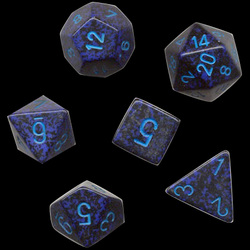 Gamer Forge Listener Email: Name: Steven Comments: I recently started DMing after playing 4th edition D&D around 10-15 times. While going over player and DM books I started to wonder if regeneration works while a PC is dying. For example, a level 2 fighter by the name of Korgul is down to -2 hit points. In the previous round he used Boundless Endurance. Since his modifier for the skill gives +2, that is a regeneration of +4. This would mean that he would get to 2 hit points at the start of his round and become conscious? Or does the regeneration stop? Well this turned into to 2 questions actually. First one is about regeneration and dying in general. Does dying count as bloodied in relation to Boundless Endurance. To me, as a DM, if regeneration worked while dying it would seem overpowered. Gamer Forge Response: DCR says: Regeneration does take effect after you fall below zero hit points. Most of the regeneration powers require you to spend an action of some kind to activate, so you must be conscious to use it. If the regeneration is in effect before the character falls, then it stays active while they are down. No need to deny what is rightfully won. BUT, keep in mind that death saving throws must still be taken when a character falls below zero hit points, as usual. In short, regeneration is fair game. Gamer Forge Listener Email: Name: Richard Besley Comments: When I first started playing with a group of completely new players, one of the first things I did was to explain the alignments as best I could at the time. When describing Chaotic Neutral, my exact words were, "A chaotic neutral character will do whatever he wants to do, so long as there is a reason that is justifiable to at least him behind doing so." Well, recently, I'm beginning to think that that explanation is not exactly accurate, or at least not perfectly clear. To explain, through every game I have played with this group, I have regretted each and every time I allowed a player to play a chaotic neutral character. The exact same thing will happen, no matter how many times I explain why it shouldn't. Said character will, for no reason I can fathom other than because his player (and by extension the character itself) wants to. Anything from using a squirrel to test out a new spell, to burning down the local pub to stop the flow of polluted beer, to openly mocking authority figures until nothing short of character death is put on the table, and even then only because I made the desire for self-preservation a required character trait. This is not to say that they do this because they prefer to, or that it's simply a style of play that they find more fun. We've played campaigns where I banned chaotic-neutral alignment, and everyone enjoyed themselves without this being an issue. It's simply that, whenever this issue comes up, I'll point it out to them and they'll reply with some variant of, 'I'm a chaotic character, and I'm being chaotic. Why is that wrong?" I don't have an answer to that. So, what's a better way to describe a chaotic neutral character? How do I explain to this group that, even if the alignment is 'chaotic,' that doesn't mean they have to play either chaotic-stupid, or insane? Gamer Forge Response: DCR says: Your alignment isn't like the alignment on your car! These things can change and shift like the winds. When it comes to not making your character "Chaotic Stupid", DCR says: 1. What defines chaos and neutrality, and what happens when you combine the two? "Chaotic Neutral", as defined by Dungeons and Dragons, states that chaos must balance the scale between good and evil, without preference to either one. This is much easier than it sounds. Being unpredictable is only small part of the big picture. The end result should be something along the lines of everything balancing out, and neither side is ahead. That's the real problem. "Chaotic Neutral" involves nobody truly getting ahead in anything. 2. Motivation! Alignment is a motivation, not a justification. It's about the start of the action, not the end. Your character's alignment is never a reason to commit a good or evil act. If the character is already bent on burning down an orphanage, he/she is gonna do it. But this also means that the character is already evil. We say that an alignment can change as soon as your GM decides that your motivations are clear. If you are hell-bent on being "Chaotic Neutral", be aware that that can change just as easily as your actions do. 3. You are an outsider! As "Chaotic Neutral", you will be extremely hard to deal with, professionally and personally. Your shifting attitudes and actions will make you hard to pin down and even harder to rely on. That's just it: you will ultimately be unreliable! Nobody will want to count on you. So what's the point of even playing? You may as well be playing a computer game. Sadly, this is where being this alignment hits a dead end. We say that it's best to just steer clear of "Chaotic Neutral". Alternately, just do away with alignments all together. Bonus XP: Jeff "The Dude" Lebowski. That's the only real exemplar of "Chaotic Neutral" we can think of. Which absolutely proves the point that this alignment is unreliable. Funny? Yes. Adventure? Not at all. At best, he is motivated by laziness and keeping Walter off his back. Remember this the next time you decide to pop that movie into your DVD or Blu-Ray player. Gamer Forge Listener Email:
Name: Regan Comments: This question about Charm Person got me musing about a problem with the spell. Obviously, you can't cast Charm Person in the middle of a forum to sway an interlocutor to your side without the other 20 persons noticing the foul play. And yet, I'd find it incredibly cool if it was somehow pulled off in a game. My question is thus : Is there any mean to covertly cast a spell in d&d3.5 / Pathfinder ? I've thought about Quicken Spell but nothing in the feat description indicates that you're not noticeable in doing this (as the spell still "takes an action", be it a swift one). Gamer Forge Response: This was a hard one. No joke, it was difficult. But when getting the most of a charm, DCR says: 1. You're gonna need a distraction. It's called a Tennessee Shuffle. When everybody is looking left, you move right. Have one of your companions run interference by causing a commotion. Fake a seizure or something. Uncontrolled outburst from the gallery. Something. This will give the player the moment he/she needs to begin casting the charm. It's not very sophisticated, but when being sneaky, its all about subtlety. 2. Just how subtle can you be? You've got several dozen, if not a hundred people actually watching you as you do this. No pressure, right? The key to winning this will be hiding the charm in your argument. We were reminded of an old "Pinky and the Brain" episode where a scheme involved hiding a subliminal message in a paragraph. This phase of the plan will involve all of your wits and charisma, as one slip of the tongue and you are BUSTED! To tip the scales in your favor, construct your argument to include certain phrases and the final sentence will have a sort of "trigger word" to have it take effect. But none of that will matter unless... 3. Do your homework. Find out who will be attending the gathering and make sure that no one will be actively looking for magical influence. This will be the easiest step, and the most crucial to the plan. None of this will work if you have the extra scrutiny centered on you. In general, when making and executing a dastardly plan like this, just take precautions. Oh, and have and escape plan! Gamer Forge Listener Email: Name: Jacob Stevens Comments: Gentlemen, My name is Jacob and I live in Raleigh, North Carolina. I have been listening to your show over the years. I started way back when it was just Revan and Malak. Those shows were interesting to say the least but over the years the show has really matured and grown into a really solid show. Even with the ups and downs you have experience over the years. So down to my question. When running a campaign, especially one with newer players mixed with optimizers, is it a fair call to limit the variety of books available for play? For feats, classes, prestige classes, magic items and spells? (or whatever other variants exist in whatever other system and it's expanded rulebooks) It seems that this would be quite unfair to the optimizer, but not doing so comes across as unfair to the beginner. Barring the idea to just separate these two breeds into different play sessions, is limiting the variety of books a sign of fair DMing, bad DMing or neither? Gamer Forge Response: Yay! We got to do two topics this week! When laying down the ground rules, DCR says: 1. If you're not sure, just start simple. Especially when introducing players who are new to the RPG experience, it's best to have finite options. It can cause a great deal of frustration for a new player to have to pour over a mountain of books to find something, when a core class will do just fine. Besides, it's counter-productive to have more information than you need. Just ask a librarian. Start your game by allowing only the core rulebook for the players. More experienced players may scoff and give you some sass for this, but this is your game, and you run it as you please. 2. Grow with the players. As the players grow, and characters live and pass (as they tend to do in a good adventure), slowly grow the source materials in which they are allowed to draw. We feel that this cultivates a true "win-win" situation for both new and experienced players. Compromise is best when resolving issues between players. 3. It's best to understand. Rather than force your will on others (which we are almost always against), clearly and concisely explain what the decisions are and stick with it. However, don't thumb your nose at logic and reason. These are your friends and deserve your respect and consideration. If someone comes up with a good reason to play as something out of a different book, take a closer look and make a decision after getting the facts. Starting a new game should be neither tedious nor heart-breaking. *Bonus XP: Always be on the lookout for players' ingenuity! If a player has access to a phone app that has a full spell listing for your game, then more power to them! Let them use that. If they use their tablet computer to store their books on .pdf files, then that makes the GM's job all that much easier. These are some great "win-win" scenarios that can make a new player feel more efficient and adapt to a new game with ease. 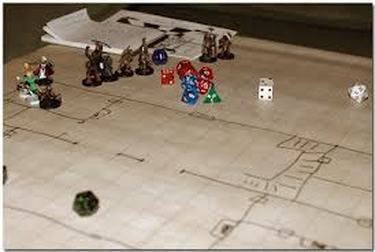 Gamer Forger Listener Email: Name: Javik Comments: I apologize beforehand if this question has been asked before, I was not able to find one, except this, which may be related: Dealing with players who try to run from everything?. Also I'd like to note that english is not my native tongue, so please be gentle. The problem I have a player in my group which tends to approach local authorities (may it be guards or churches) when facing a threat. He thinks that, given his role (a bard in a medieval world, so, more or a less, a civilian), this is what one of his kind would do in such situations. The other characters, more powerful (knight, ranger, sorcerer, ...), are the passive kind of players and do not prevent him from doing that. While this behavior is not unjustified, the whole point of playing the game is to solve problems on your own (IMHO), even if they seem to be overwhelming. Sometimes it is justified, but most of the time it makes things only more complicated in terms of: •The storyline, like the one time they faced a single undead raised by a curse in a city at night, where he handed over the ring which has caused the curse to the local temple, instead of trying to find out about the origins of the curse and how to break it. As soon they have found out that the curse has not been broken and it only affects a certain party member, the required ring was out of reach ... ooops, now they are in trouble (including the storyline). •The threat level, because the encounters have to be extended, so that they are a threat to a group of adventures AND a bunch of guardsmen. One time the same player in another group abandoned the whole group for a 14 days travel to contact a befriended inquisitor about a serious evil thread to get the support of a bunch of knights. The examples above are presented in a more superficial way than they actually are. The true story behind is way more complicated, including aspects of personal motivation. I could tell the player to stop doing that, but I'd prefer to solve the issue in the game, without overstretching means like: •Authorities are too ignorant/busy/incompetent to care (which in the long run will seem like all authorities in the world are essentially only decoration) •The adventure is happening in a "closed" environment like extreme wilderness, a ship on the ocean, an area locked because of a plague etc. The question What can I do ? How do you deal with such behavior ? Gamer Forger Response: This one was a long question, but we got your solution in one neat, tidy packet! Your party needs a spoony bard, and here's some good reasons why you should keep doing it. But being a bard ain't easy. When it comes to really confusing situations with your bardy-bard, DCR says: 1. Bards aren't really fighters, anyway. Not fighting is just as legit as getting your hands dirty. Indeed, the concept of "bard" was never intended to be a heavy damage dealer. They were meant to supplement the others in their duties and function as spokesman for the party. Playing a coward is just as valid as playing a fearless barbarian. There's no need to encounter the pressure of others to behave as they do. Other players should worry about how they play, not how others do. 2. You've encountered the consequences of your actions, now you get to deal with it. Not much else to say about that. Running away is just as good, but there's still consequences. No matter what you do, this will always be the case. Ain't no running away from your fate. 3. Talking is your job. If you're not feeling up to snuff keeping up with the "tanks" and "casters", maybe "bard" isn't the right choice for you. Nothing wrong with that. The classes were created to have distinct strengths and were meant to played to those strengths. Frankly, it's best and easiest to say that it's time to consider trying a different character class. There's no shame in realizing you may be wrong. Just remember to handle that gracefully, please. Firebird suggests that you ask "What do I want to play today?" Think of how you like to do things. *Bonus XP: When running and/or playing any tabletop RPG: Everything is a variable. Never count on players behaving a certain way. Never count on a GM to behave a certain way. You may no always be comfortable being outclassed or overmatched, but you must be okay with the circle of life. Just because you see a mountain, doesn't necessarily mean you have to be the one who climbs it. Its just a mountain. Remember to listen to the complete Gamer Forge segment each week during the "live" broadcast from Epic Puzzles and Games in West Valley City, Utah every Monday from 6-8 pm MST. If you have issues or questions in your game, contact DCR to help level up your game at [email protected]! 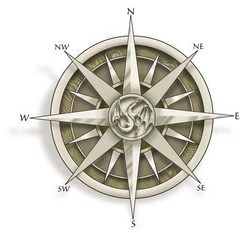 This week, DCR smashes down several questions regarding rulings on commonly encountered problems. Guaranteed fresh! Listener Email: Name: Sarah Comments: What are the most beginner friendly table top role playing games out there? Gamer Forger Response: When you're looking for "beginner-friendly", DCR says: Dungeons and Dragons 4th edition is easy to transition to if your only familiarity with RPG's is MMOs. Everything is organized into macros and character creation is pre-sorted, so all you've got to do is decide what type of role in the party you wish to play. Just about anything involving Unisystem is a winner. Buffy the Vampire Slayer is definitely geared towards a simple mechanic and character creation is a breeze. It also favors action and plot advancement above the statistical advantages players have over enemies. Marvel Superheroes from Margaret Weiss productions is great due to its simplicity of advancement. It features a slightly higher learning curve than the other two, but the advantage is that once your character is generated, any further statistical growth is already built in to the character. Listener Email: Name: TJ Comments: Does the main target of the ghoul touch spell get a saving throw? Gamer Forger Response: When stinking up the place with "Ghoul Touch", DCR says: You can't target a person, as a single object doesn't constitute and area. You will be targeting the area the person is standing on. You can target a floor or wall or ceiling, but you can't cast it on a table or a horse. Whomever is at the center of the area is granted a saving throw, as normal. If your player argues with you, give a sucker punch and tell 'em, "Guy Named Joe sent ya!" Listener Email: Name: Midvale Gaming Group Comments: Is the animating force of a golem always from the Elemental Plane of Earth? Gamer Forger Response: When making your Golems, DCR says: The primary animating force of a Golem is usually from the Elemental Plane of Earth. But not always. The animating force can be defined as just about anything ethereal, such as the souls of dead orphans or the woe of a million angels. Give your golem that extra special something by defining this power source with an offbeat description. Listener Email: Name: Calvin Smith Comments: Can you help me out here. Is it possible to creating weapons and armor from giant crab remains? Gamer Forger Response: You too, can have a set of crab armor! DCR says: Totally! We say that it most likely will be a description of hide or scale armor, depending on the game system you are using. Dark Sun is all about using hides and shells as armor. Listener Email: Name: Fort Worth Gaming Group Comments: We ran into your show by accident and have loved what we have heard so far. We have a question that has been buzzing around the table. Would you be able to weigh in on this one? Does making an opportunity attack with a ranged weapon provoke an opportunity attack? Gamer Forger Response: Opportunities abound! When making an opportunity attack, DCR says: Yes and no. Just because you are entitled to make an opportunity attack, doesn't mean you should get it. Take into account line of sight, cover, and relevant abilities or feats. If you have a ranged attack prepared (such as a crossbow or spell) then you can make the attack, provided you are within range. However, countering that opportunity attack is also possible, provided that another opponent has an attack prepared. As always, think of how the character would behave, not what you would do. *Bonus XP: Keep in mind what would make your character awesome in the context of an action sequence in a movie, not what your stats read and what your bonuses are. Taking a gamble on a friend can reap huge rewards for all parties involved. Think beyond the squares and tiles and the keyboard; get active in telling your own character's tale! |
The GamerForge is DungeonCrawlersRadio’s most favoritist segment of the entire show. Have you ever had a boggling rules question that no one in the group can figure out? Write in to us and we’ll help try to solve it! Are you a Game/Dungeon Master who needs help squashing animosity at the table or dissension in the ranks? Perhaps we can help!
If you are in need of help, encouragement, or an uber devious way to get a TPK, we are here to help. No matter your needs, we’ll help you get more from your gaming! The Gamer ForgeWhere Players & Game Masters can come for valuable information to level up your game! Archives
August 2013
Categories
All
|
 RSS Feed
RSS Feed








